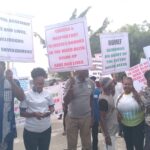The Nigerian government must actively integrate value for the life of its citizens in all facets of policy making and implementation if the country is to make appreciable progress in attaining its corporate goals.
Governments world over also must pay attention to the safety of life and property. In some climes all life are valued dearly – Plant, Animal and especially the human life.
This was made known by Alexander Faranpojo, President Virtues Life Foundation and the convener VALUE FOR LIFE Conference, at a press briefing to mark the formal launch of the foundation in Lagos, Nigeria.
“If you consciously try to aggregate all the data of violent deaths in Nigeria, you will realize that this is indeed an emergency which must be confronted frontally. It is no longer just an issue of requesting security agencies to identify culprits or prevent attacks. It must of a necessity go deeper than that and become hard coded into the political, social and moral frameworks that govern our corporate existence as a nation,” he said.
According to SBM Intelligence, a socio-economic research firm, at least 10,300 Nigerians lost their lives in 2021 which represented a 47% increase over 2020’s figure of 7,063.
In January 2022, a report detailed how within the first three weeks of the year, over 486 Nigerians had been killed, mostly by armed bandits in the North-western part of the country. The countless lives lost in the boko haram insurgency and the herdsmen-farmer clashes in the north central remain dark spots in our national conscience and consciousness.
In 2017, The Red Cross society, said over 10,500 people where declared missing in Nigeria in that year. Many of these are never found and in February 2022, the National Assembly had called on the President to declare a national emergency on ritual killings.
“The rise in case of ritual killings, especially for the purpose of acquiring wealth and fame in Nigeria is a trend that we are all aware of. We also have the unchecked actions of kidnappers, bandits, terrorists and countless other non-state actors all involved in what has now become the business of arbitrary taking of human life,” Mr. Faranpojo said.
“For instance, a report published in a national daily last year cited findings by the Foundation for Partnership Initiative in the Niger Delta (PIND) which showed that over 150 young women had been killed for ritual purposes in the region between 2018 and 2021”.
“As a people, we need to put in place mechanisms that educate and enlighten our citizens on the value of human lives. We need to build partnerships across government, religious organizations, civil society and traditional institutions that execute this advocacy.
“More importantly, government, as the ones saddled the most and as custodians of the duty for the lives of everyone within their borders needs to build policy frameworks and effective coalitions that extract commitments and actions from all sectors of the society to fight this menace.
“Why is this important? Government generates revenue every year and budgets for the provision of infrastructure and basic amenities for the citizen. The very essence of government is the management of public resources for the benefit of the citizen.
“Where protection and safeguarding of the lives for which all these efforts and investments are targeted is not effective, then all the investments are futile. We need to begin to see the concept of the value of the life of a Nigerian differently. By transferring the need to preserve life to the top of government’s agenda, and channeling every resource – human and material – into this effort; by creating a line of sight between every government policy and how the value of the Nigerian life is identified and preserved through that policy, we may find ourself stemming this ugly tide,” Mr. Faranpojo stated.
“This process of consciously identifying and connecting the dots and supporting the implementation of such mainstreaming initiatives is at the centre of what we do and we are open to working with all those currently engaged in different ways for the Nigerian.”

 Join Daily Trust WhatsApp Community For Quick Access To News and Happenings Around You.
Join Daily Trust WhatsApp Community For Quick Access To News and Happenings Around You.


